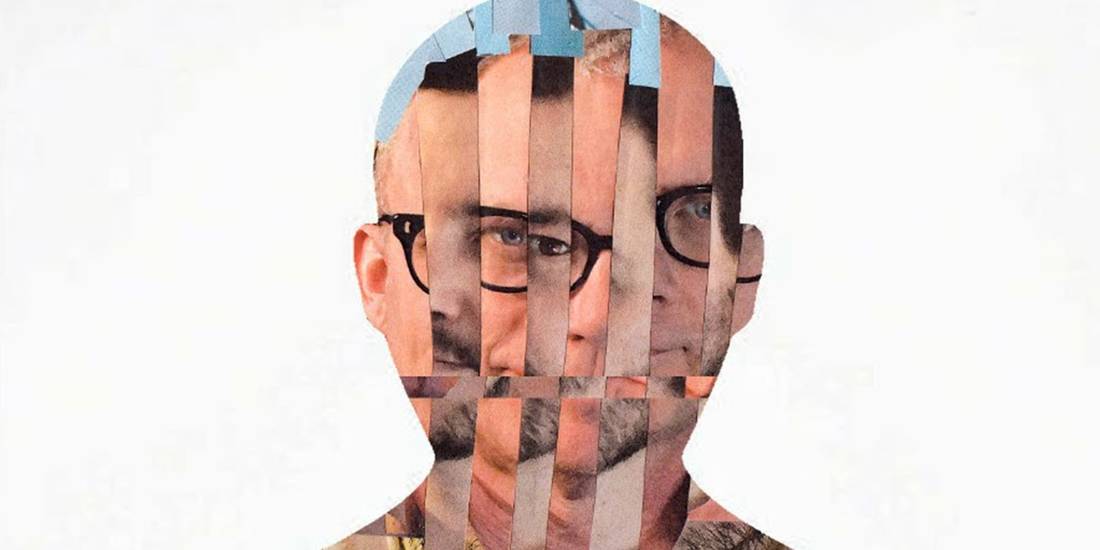How are you guys responding to this global pandemic?
Drew Daniel: It impacts me personally because many members of my family and some of my friends have had COVID. It’s frightening and draining and that wears down your energy. It’s not true that trauma is inspiring, it’s mostly just exhausting. I have found it much easier to write literary criticism than to make music during the pandemic. That’s simply a report about how my mind works. I have had fun making the manipulations of Boguslaw Schaeffer’s music with Martin at home, but I find that quarantine makes me need to simulate solitude more as a kind of psychological defense system. That’s not conducive to musical partnership. Martin has been an amazing person to share this horrible pandemic with: kind, funny, creative, patient. He’s kept me sane. I’m not sure I have done the same for him.
MCS: Unlike many Americans, we have taken this thing seriously since the beginning. I have been looking at it like a very long space voyage, or something, living the idea that we just have to stay in our ship for a year (or, you know, a VERY long time). When looking at it THAT way, the opportunities for “cheating” (actually going outside, talking to our friends in our front yard) are especially pleasurable. But musically, yes, it has been an opportunity to do some things I felt “too busy” to do before. We have transitioned to using Logic Pro for Matmos, I have been doing stuff in quadraphonic, I’ve been trying to practice the piano everyday, I have become better at editing video, etc, like an enforced residency. The results that YOU can see are mostly the many videos we have made for "The Consuming Flame".
Drew, what's your interest in nowadays punk (hardcore, crust etc)? How did it evolve through its long history?
Drew Daniel: I’m 49 years old now, so, if I’m honest, I’m not following contemporary punk and hardcore bands much. I think I have also drifted more towards the fringes of metal and away from “hardcore.” There are new bands that play what would loosely be described as “heavy music” that I am absolutely into: Cloud Rat, Terminal Nation, Pig Destroyer. Even some of the classic bands are making new records—for example, Drop Dead. But I just do tend to listen to a lot more black metal and death metal than hardcore. I think the way my tastes shifted overtime from when I was an adolescent was really just starting from the basics and gradually going deeper and wider internationally. There are so many great Japanese and Swedish bands that I just didn’t know much about when I was a teenager in the 80s because of the way that distribution worked with independent records then. It’s much easier to find a crust band from New Zealand like Spiteful Urinator via Bandcamp now. I think the thing that was very prescient that impacted my listening to hardcore the most was probably Pushead’s
“Cleanse the Bacteria” compilation – it had bands from all over the world, and many different styles.
So what’s the next step for your solo project, apart from the recent “Shall We Go On Sinning So That Grace May Increase”?
Drew Daniel: That record was part of a “one two punch” with “Am I Free to Go?” and I honestly don’t know. I want to learn from “Shall We . . .” without clinging to it. I was very moved and very surprised that so many people supported an album where I broke away from my own style, and now the question is: where to next? You’re asking me but I have to honestly say I don’t know. I think some kind of rethinking of what “deep house” might mean to me could be the starting point. But I don’t have in mind something fussy and nostalgic that feels like a style exercise. I don’t think that’s called for. I am struggling to answer this question!
How do you choose your track titles?
Drew Daniel: I like it when a title has at least two layers. It has to work immediately as language. It doesn’t have to be a lit up neon sign that points to a meaning. A title can be a mist, or a red herring. But it has to prompt some desire. The other layer happens when it’s a reference to something. The SPT titles are often quotations or citations with a little spin on them, hopefully, that comes from how they are being re-used. Queer people do this with mass cultural forms all the time: you make the popular personal through your attachment to the right fragment of it. That can be the Bible, or Shakespeare, or something raunchy that your friend said in a bar. It doesn’t have to be “high culture” to be “culture.”
Martin, would you ever get involved in another "Instant Coffee!" album?
MCS: Yes, of course! The problem with Instant Coffee is that Lyle moved away, into a happy picture and I never see him anymore!! There was/is? a second “band” called Ear, Nose and Throat that is Jason Willett and myself but instead of Lyle Ellis there’s Max Eilbacher! I believe a cassette is being (very slowly) put together by Jason and will be released on Megaphone… one day soon!
"Batu Malablab" and "Aqua Sauvage / Stuffed Concrete" are highly experimental and difficult to describe in words, because they imply so many diverse sounds as well as new instruments and avantgarde techniques that are sometimes unsettling.
MCS: Do you find them unsettling? Gosh! That was not my intent. Well, maybe a little.
Besides that, how would you describe your solo work to an unprepared listener?
MCS: I’m not Drew, I’m not the describer in the band… his descriptions are there in the Bandcamp page for both of those releases! I have JUST NOW (I’m not even kidding, I clicked the button just before sitting down to answer these questions!) re-released Batu Malablab on Bandcamp!



